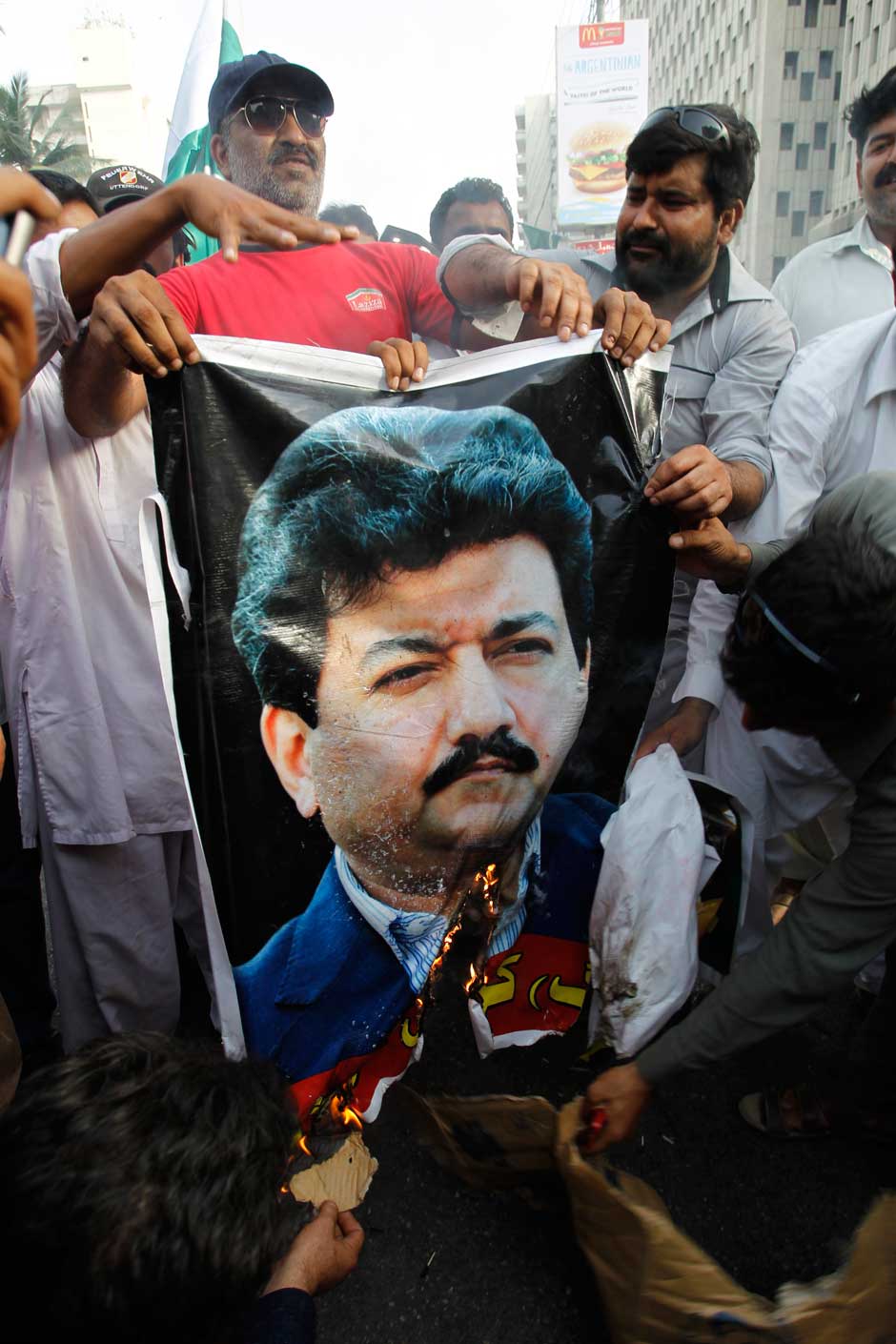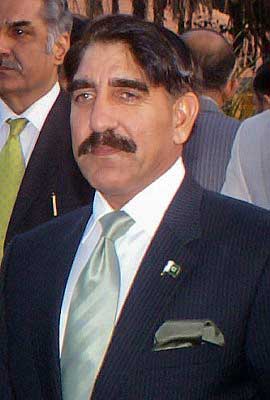Over the past week, a shocking debate has raged in Pakistan, in full view of the Pakistani people, about the nature and power of the Inter-Services Intelligence or ISI, the country’s elusive, military-operated spy agency. It has emerged in a rare face-off between the ISI and the Jang-Geo group, Pakistan’s largest media house, following the attempted assassination of journalist Hamid Mir, who hosts one of Geo TV’s most popular current affairs programs.
On April 19, as the forty-eight-year-old Mir was being driven out of Karachi’s airport, a man fired nine shots at him with a 9mm pistol, hitting him in the ribs, stomach, hand, and thigh, before fleeing the scene. Mir was rushed to a hospital, where he remains in critical condition. A few hours later, his younger brother went on Geo News and laid the blame for the shooting not on some extremist group, but on the ISI itself. “A few elements in the ISI are against Hamid Mir due to his viewpoint about [former military dictator] Pervez Musharraf and the Balochistan crisis,” said Amir Mir, who also works for Jang-Geo. He added that he held the head of the ISI, Lieutenant General Zaheer-ul-Islam, “personally responsible” for the attack. Still more explicit was the montage of pictures used by Geo News to illustrate this accusation: an unconscious Hamid Mir with a respirator on his mouth; a bullet-riddled car; and a photograph of Zaheer-ul-Islam—a man who shuns television appearances—looking smug and serene as he shook hands with soldiers at a ceremony.
Within minutes there was a furious response to these charges: first on Facebook and Twitter, where mysterious cyber-entities, many of them with sultry female names, unleashed a torrent of hate against the “traitors” at Geo TV; then, a few hours later, on Geo’s rival TV channels, Express and ARY, where assorted analysts and columnists attacked Hamid Mir, tried to portray the allegations against the ISI as an Indian-American conspiracy, and raised questions about the intentions of Mir Shakilur Rahman, Geo’s eccentric, Dubai-based owner. (One of the most interesting revelations to emerge in all the mudslinging last week was Rahman’s dispute with the ISI over the latter’s alleged support for an upcoming TV channel that threatens to cut into Geo’s market share.)
I’ve never met Hamid Mir and don’t watch his show with any regularity. But I panicked when I heard about the attempt on his life. This is because Mir is on the same “hit list” of media executives and journalists, apparently drawn up by the Pakistani Taliban in February, as my father, Najam Sethi, who hosts a similar program on Geo and has come under pressure for criticizing the military and Islamist groups in the past. Adding to my alarm was the timing of the attack, which came just weeks after gunmen ambushed my friend Raza Rumi, who is a columnist and a TV show host for Express News, a Geo rival. Rumi was attacked on a busy road one night in Lahore and fell to the floor of his car when he saw the first flash; his attackers took him for dead and sprayed his car generously with bullets, killing his twenty-five-year old driver instead.
As might be expected among any group of political journalists and commentators, Mir, Rumi, and my father have taken different positions on various issues of national policy. But their shared occupational hazard—the discussion of “sensitive” subjects in a conflict-riven country—has put them under similarly nebulous threats. Hamid Mir, for example, had angered the Taliban by giving favorable coverage to the anti-Taliban education activist Malala Yusufzai, who herself was nearly assassinated in 2012; and he had angered the Pakistani military for suggesting that other high-ranking military officials be tried in the case against General Musharraf, who is accused of treason.
Why did Mir’s brother single out the ISI for blame in Mir’s shooting?
Hamid Mir has not always been a critic of the ISI. As a young journalist working in the Urdu press, he used to write admiring columns about the agency’s covert support for jihadists in Indian-controlled Kashmir (his family has roots in the area). Later, he became famous as the first journalist to interview Osama bin Laden after the September 11 attacks. But he had grown skeptical of the military’s policies in recent years, particularly in Balochistan, where it has conducted a brutal offensive against separatists. In February, Mir devoted an episode of his show to Mama Qadeer Baloch, a seventy-two-year old man whose activist son was allegedly killed by the ISI, and whose march for justice to Islamabad was mostly ignored by the mainstream media. Indeed, a few days before he was attacked, Mir told his colleagues that “rogue elements” within the ISI were out to punish him for his coverage of the Baloch cause.
Advertisement
Still, although the agency has sometimes been suspected of involvement in attacks on journalists, such suspicions are rarely spelled out in the Pakistani media. Tapped phones, hacked email accounts, comprehensive files on your “character,” and, if you are perceived as “pro-India” or “pro-America,” the odd threatening phone call or menacing car-chase—all of these are unremarkable facts of life for journalists who report or comment on the “national interest,” a euphemism for policies handled directly by the military. While you might discuss such pressure tactics with friends and family—occasionally with pride, since it shows your work is being taken seriously “at the highest levels”—you won’t likely mention them in public, partly out of fear (you’ll only aggravate “them”) and partly out of resignation (who will believe you anyway?).
So deferential is the Pakistani press in this regard that a practice has developed of referring to the military simply as “the establishment”—a large, loose word that obligingly obscures the very thing it seeks to describe. A resulting irony of political life in Pakistan is that most people are now aware of something called “the establishment”—the word has even entered the Urdu language—and its pervasive presence in Pakistani affairs, but are not sure what it represents or where its centers of power lie.
By calling out the ISI on prime-time television, Amir Mir was repudiating this culture of evasion and self-censorship and flouting the military’s institutional sanctity. So overwhelming was the backlash that it forced Geo, within a few hours, to bring together a panel of journalists to defend its position and do some damage control. But here too, in between the qualifications and rewordings, what came out repeatedly was the unwholesome nature of the ISI’s relationship with the media. “Even if the ISI is not involved in this attack,” said Asma Shirazi of Dawn News, speaking with furious lucidity,
it is involved. That is because this country’s security, this country’s protection, is the responsibility of the government and these agencies. These agencies tap our telephones, these agencies watch us, these agencies follow us around, these agencies keep tabs on our homes, our children…. They have all our records. So they should have known that in such a big city, in broad daylight…a man was about to attack such a well-known person, a man who is a national asset, a man who has received threats.
The veteran journalist Iftikhar Ahmad, speaking in a tone of mock-innocence, took a similarly provocative line:
I would urge the ISI chief to disclose the names of the culprits…within the next twenty-four hours, or forty-eight hours, or seventy-two hours. After all, you are tapping our phones, you know everything about us, surely you must also know who has done this…
Since Geo’s “special transmission,” however, what seemed like a moment of reckoning—a chance for the Pakistani media to rally around the cause of free expression—has devolved into a many-sided fray. The spy agency, sounding a note of stately displeasure, has issued a statement denouncing the “baseless allegations leveled against ISI,” but not offered its own insights into the attack and who was behind it. An eight-member Joint Investigation Team, which includes members of the ISI and other branches of Pakistan’s security apparatus, has been assigned to investigate the attack and has yet to identify the shooter.
But mostly, the ISI has relied, as ever, on proxies to do its bidding: it has pressured the Defense Ministry to send a complaint against Geo TV to the Pakistan Electronic Media Regulatory Authority (PEMRA); it has forced cable operators in military-controlled areas to take Geo off the air; and it has brought out various semi-political bodies—traders’ associations, army veterans’ groups, Islamist charities—to defend its cause on the streets. (“We Love Army” is a favorite slogan on posters and placards across the country.)
Rival media companies, meanwhile, have used the occasion to engage in a relentless campaign against the broadcaster. (“Geo’s attempt to malign ISI slated” read a triumphant headline in the Express Tribune newspaper; “A patriotic public boycotts the Jang-Geo group,” cried a feature on ARY News.) Privately, several journalists employed by these organizations have noted the irony of Geo’s isolation given its own callous coverage of other media groups in the past. (Geo scarcely skipped a beat when Raza Rumi, who works for Express, was attacked in his car last month.)
For its part, Geo has retreated from its position of defiance. In the days after the shooting, Geo executives had interspersed the channel’s programming with rousing portraits of Mahatma Gandhi, Martin Luther King, Jr. and, most daringly, former Pakistani Prime Minister Zulfikar Ali Bhutto, who was executed by the military in 1979—visionary leaders who stood up for rights and challenged the status quo. But now its commentators are soberly advocating a “legal course,” hoping to enlist the judiciary, who are presumed to be sympathetic to the broadcaster, to quash the efforts by the Defense Ministry to have Geo taken off the air. (Geo’s campaign in favor of the last chief justice of the Supreme Court, Iftikhar Muhammad Chaudhry, who was dismissed by Musharraf’s military regime, was credited in part with his reinstatement.)
Advertisement
As for Hamid Mir, he still has three bullets lodged in his body. On April 24 he issued a statement from his hospital bed, clarifying that the threat to his life emanated from “an ISI within the ISI.” Some intelligence agents, he said, had informed him a few days before he was attacked that he was on a terrorist hit list. But who these terrorists were, the spooks didn’t say.
Significantly, this aspect of the threat to journalists—the dangerous overlap between “state and non-state actors,” or what left-leaning Pakistanis have long described as the “military-mullah alliance” and accuse of militarizing Pakistani society—has conveniently eluded the debate, which has mainly fixated on the particulars of one TV channel’s treachery.
The “establishment,” once again, has prevailed. But not without getting mixed up, however briefly, in the minds of ordinary, TV-watching Pakistanis, with all that is wrong with their country.



